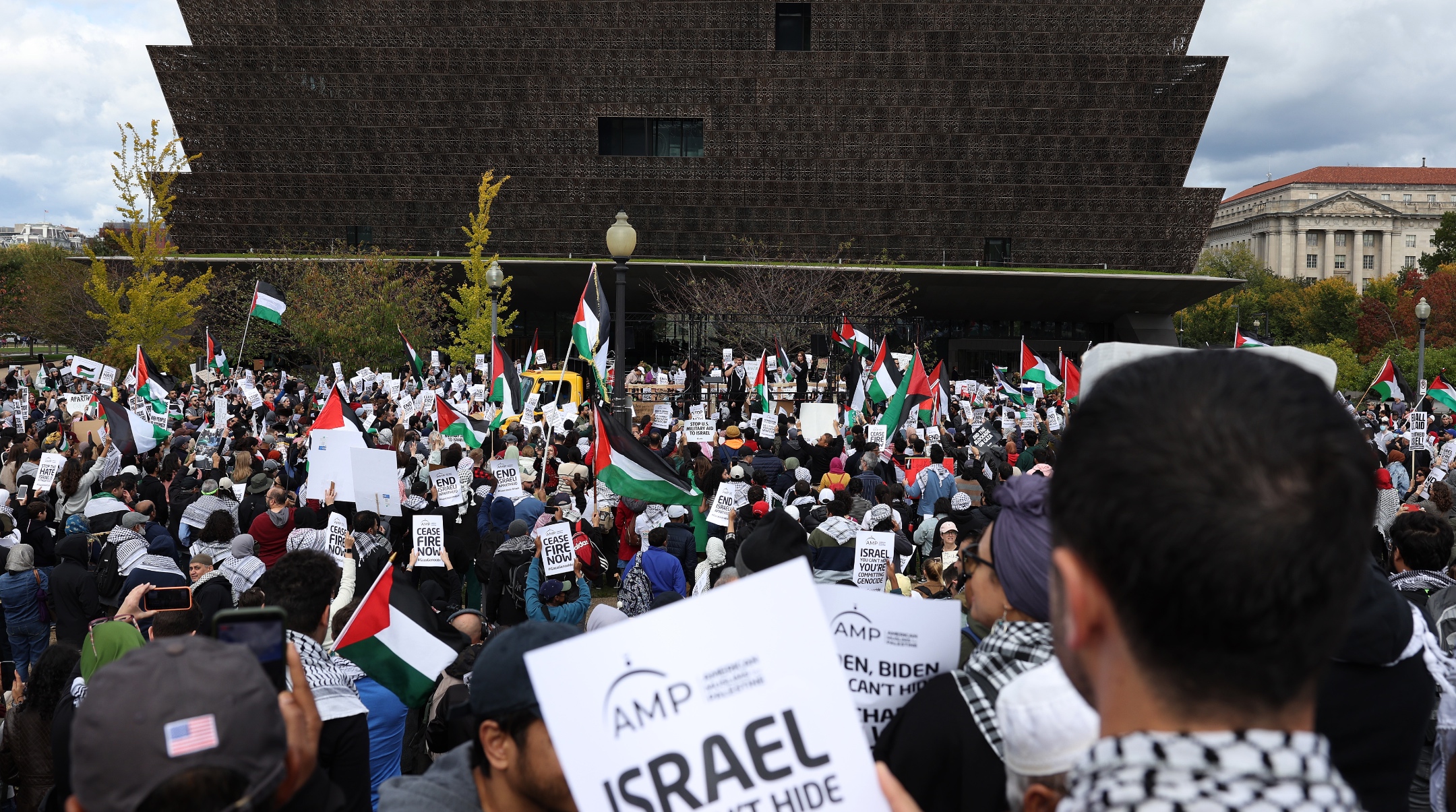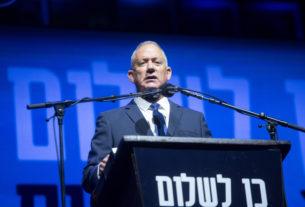WASHINGTON ((JEWISH REVIEW)) — At about 11 a.m. Tuesday, Secretary of State Antony Blinken said the Biden administration favored “humanitarian pauses” so that assistance could reach Gaza Palestinians caught in Israel’s war with Hamas.
Left-wing social media lit up: Until Blinken’s comments, made to the United Nations Security Council, the Biden administration had rejected calls for a ceasefire.
“The tide is turning — the Biden administration is beginning to recognize that this war will only bring more death and suffering for Palestinians and Israelis,” IfNotNow, a left-wing Jewish group that accuses Israel of “genocide” and has led protests for a ceasefire, said on X, the platform formerly known as Twitter.
Blinken’s comments were a reversal of sorts. Just last week the United States vetoed a Security Council resolution calling for a “humanitarian pause.” But shortly after Blinken spoke, John Kirby, the National Security Council spokesman, threw cold water on any notion of U.S. support for a ceasefire.
“We’re going to continue to make sure Israel has the tools and the capabilities that they need to defend themselves,” he said just after 1 p.m., when asked at the daily White House press briefing about the prospects of a ceasefire. “A ceasefire right now really only benefits Hamas.”
Given Kirby’s statement, it appeared Blinken’s support for “humanitarian pauses” meant just that — short breaks in the fighting so food, water and medical assistance could reach people in need, nothing more. “We want to see all measure of protection for civilians. Pauses in operation [are] a tool and a tactic that can do that for temporary periods of time,” Kirby said. “That is not the same as saying a ceasefire.”
Calls for a ceasefire from some progressives, including Jewish groups, have been loud and insistent. They are backed by nearly two dozen progressive members of Congress, including Vermont Sen. Bernie Sanders, who is Jewish.
But Kirby’s forceful rejection shows how ineffective those demands have been in the face of a Biden administration steadfast in its support for Israel, as well as a large majority of Congress that opposes a ceasefire.
Halie Soifer, the CEO of the Jewish Democratic Council of America, said she has counted 23 Democrats in the House and Senate who have called for a ceasefire, out of 263 overall. Congressional Republicans are opposed almost wall-to-wall to a ceasefire.
“The overwhelming majority — more than 90% of all Democrats in the Senate and the House — stand with the president on the issue of a ceasefire,” Soifer said, although she noted that she has only been tracking those explicitly in favor of a ceasefire, and not those explicitly opposed.
Hamas broke a 2021 ceasefire when it launched its attack on Israel Oct. 7, killing more than 1,400 people, mostly civilians, wounding thousands and abducting more than 200. Israel’s ensuing war on Hamas has killed more than 5,000 people, Gaza’s Hamas-controlled health ministry says. It is not clear how many of those casualties are civilians, though a significant number are children.
A new ceasefire would aim to end all combat, including Israeli airstrikes and Hamas rocket launches, as well as all cross-border infiltration between Gaza and Israel. It would also leave Hamas in control of Gaza. Israel rejects those terms, saying the return of the hostages and the dismantling of Hamas must come first. A ceasefire would also nix a potential ground invasion by Israel that hopes to achieve those ends.
Biden has opposed a ceasefire because he, like Israel, believes Hamas must be permanently debilitated. He has called on Congress to deliver more than $10 billion in defense assistance to Israel. He said on Monday that at a minimum, the hostages should be released before a ceasefire is countenanced.
“We should have those hostages released and then we can talk,” he told a reporter shouting out a question about a ceasefire at a White House event.
Sanders, the de facto leader of progressives in Congress, was among the first to make the call for a ceasefire.
“The bombs and missiles from both sides must end, massive humanitarian aid must be rushed to Gaza, and the hostages must be returned to their families,” Sanders said in an Oct. 17 statement.
Members of the Squad, the group of House progressives, joined last week’s rally at the Capitol, which was led by the anti-Zionist Jewish Voice for Peace along with IfNotNow, and culminated in arrests.
J Street, the liberal Jewish Israel lobby that is influential among Democrats, is not joining the calls. “Our position is, we have not called for a ceasefire,” said Logan Bayroff, J Street’s spokesman. “Our position is, Israel has the right to defend itself in accordance with international law.”
The group last week urged lawmakers to sign a letter spearheaded by three Jewish House Democrats wholeheartedly backing Biden’s policy on the war. The letter did not explicitly oppose a ceasefire. But by garnering a majority of the caucus — 131 signatures, including every Jewish House Democrat — it created a firewall against demands for a ceasefire when taken in combination with Republican votes.
The ceasefire calls have at times been intensely personal. On Tuesday, nearly 300 veterans of Sanders’ 2016 and 2020 presidential campaigns signed a letter and made a video urging him to introduce legislation in the Senate matching a resolution in the House that calls for a ceasefire. The House resolution, sponsored by Reps. Rashida Tlaib of Michigan and Cori Bush of Missouri, has so far garnered just 18 cosponsors. “Many of us, your former staff, share your Jewish heritage,” the letter to Sanders said.
IfNotNow, which backed the letter, said Sanders needed to do more. Eva Borgwardt, the group’s spokeswoman said in an email, “We need him to stay true to his legacy of principled, antiwar leadership now.”
Also on Tuesday, the Boston Jewish Community Relations Council effectively expelled a constituent, the Boston Workers Circle, after it joined with anti-Zionist groups at a pro-ceasefire rally that also accused Israel of “genocide.”
The Intercept reported on Oct. 13 that J Street threatened to pull support from lawmakers who failed to join a separate resolution condemning Hamas — one that has so far garnered 425 cosponsors out of 434 members of Congress. (The resolution has yet to reach the floor because the Republican majority has been floundering in its attempt to elect a speaker.)
Bayroff denied that report. J Street’s political action committee is still raising money for New York Rep. Jamaal Bowman, who is a member of the Squad and one of the holdouts. Bayroff said he did not see the disagreement over the ceasefire creating long-term rifts between J Street and its progressive allies in Congress. The group does not endorse most other members of the Squad, including Tlaib, Minnesota Rep. Ilhan Omar, New York Rep. Alexandria Ocasio-Cortez, Massachusetts Rep. Ayanna Pressley and Missouri Rep. Cori Bush.
“We appreciate that views of members of Congress and folks will continue to evolve and we’re not looking for everybody to be marching in ideological lockstep right now, or to be cracking down on folks with slightly different opinions,” Bayroff said. “We certainly believe that every single one of our endorses needs to condemn or have condemned what Hamas has done in no uncertain terms.”
Bowman condemned the attack almost immediately but did not join a letter signed by more than half of House Democrats, including some prominent critics of Israel, praising Biden’s handling of the crisis.
Soifer, who noted that JDCA’s affiliated PAC did not endorse and has no plans to endorse any of the 23 Democrats calling for a ceasefire, agreed that no intra-party rift was in the offing, because the issue of a ceasefire was a difference of policy, not philosophy.
Soifer nonetheless said Tlaib should be considered as having crossed a red line and as having sowed danger for the Jewish community. Tlaib has not forcefully condemned Hamas, Soifer said, and has not retracted claims that Israel bombed a hospital, even though experts have now assessed that the explosion was caused by a misfired Palestinian rocket.
U.S. officials strengthened their assessment on Tuesday to say they believed with “high certainty” that a Palestinian rocket caused the blast.
“It was dangerous because it was a lie,” Soifer said. “Once that was clear, as a U.S. policymaker and a member of Congress, she should clarify her remarks. And she chooses not to. So it’s dangerous to perpetuate that lie, especially at this incredibly volatile time.”




